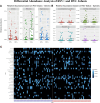Postmortem Nasopharyngeal Microbiome Analysis of Zambian Infants With and Without Respiratory Syncytial Virus Disease: A Nested Case Control Study
- PMID: 37093853
- PMCID: PMC10348642
- DOI: 10.1097/INF.0000000000003941
Postmortem Nasopharyngeal Microbiome Analysis of Zambian Infants With and Without Respiratory Syncytial Virus Disease: A Nested Case Control Study
Abstract
Background: Respiratory syncytial virus (RSV) is the most common cause of bronchiolitis and lower respiratory tract infections in children in their first year of life, disproportionately affecting infants in developing countries. Previous studies have found that the nasopharyngeal (NP) microbiome of infants with RSV infection has specific characteristics that correlate with disease severity, including lower biodiversity, perturbations of the microbiota and differences in relative abundance. These studies have focused on infants seen in clinical or hospital settings, predominantly in developed countries.
Methods: We conducted a nested case control study within a random sample of 50 deceased RSV+ infants with age at death ranging from 4 days to 6 months and 50 matched deceased RSV- infants who were all previously enrolled in the Zambia Pertussis and RSV Infant Mortality Estimation (ZPRIME) study. All infants died within the community or within 48 hours of facility admittance. As part of the ZPRIME study procedures, all decedents underwent one-time, postmortem NP sampling. The current analysis explored the differences between the NP microbiome profiles of RSV+ and RSV- decedents using the 16S ribosomal DNA sequencing.
Results: We found that Moraxella was more abundant in the NP microbiome of RSV+ decedents than in the RSV- decedents. Additionally, Gemella and Staphylococcus were less abundant in RSV+ decedents than in the RSV- decedents.
Conclusions: These results support previously reported findings of the association between the NP microbiome and RSV and suggest that changes in the abundance of these microbes are likely specific to RSV and may correlate with mortality associated with the disease.
Copyright © 2023 The Author(s). Published by Wolters Kluwer Health, Inc.
Conflict of interest statement
Supported by the Bill and Melinda Gates Foundation. W.E.J. and J.M. were funded in part by NIH grant R01 GM127430. W.E.J. and A.R.O.M. were supported in part by the NIH under grant R21 AI154387. The other authors have no conflicts of interest to disclose.
Figures




References
-
- Midulla F, Nenna R, Scagnolari C, et al. . How respiratory syncytial virus genotypes influence the clinical course in infants hospitalized for bronchiolitis. J Infect Dis. 2019;219:526–534. - PubMed
Publication types
MeSH terms
Grants and funding
LinkOut - more resources
Full Text Sources
Medical
Research Materials
Miscellaneous

